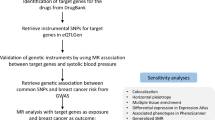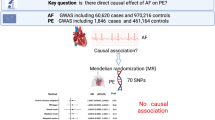Abstract
Vascular endothelial growth factor (VEGF) is one of the most potent endothelial cell mitogens and plays an important role in angiogenesis. Many published studies have evaluated the association between the VEGF 936C>T polymorphism and breast cancer risk. However, the published findings are inconsistent. In order to derive a more precise estimation of the association, a meta-analysis was performed in this study. A total of eight studies including 5,729 breast cancer cases and 5,868 controls were identified. Overall, no significant associations between the VEGF 936C>T polymorphism and breast cancer risk were found for TT versus CC (OR 0.93, 95% CI 0.73–1.19), CT versus CC (OR 0.91, 95% CI 0.77–1.09), TT/CT versus CC (OR 0.92, 95% CI 0.78–1.08), and TT versus CT/CC (OR 0.96, 95% CI 0.75–1.21). In the subgroup analysis by ethnicity, source of controls, and menopausal status, there was still no significant association detected in any of the genetic models. In summary, our results suggest that the VEGF 936C>T polymorphism may not contribute to breast cancer susceptibility.

Similar content being viewed by others
References
Smigal C, Jemal A, Ward E, Cokkinides V, Smith R, Howe HL, Thun M (2006) Trends in breast cancer by race and ethnicity: update 2006. CA Cancer J Clin 56:168–183
Ferrara N, Gerber HP, LeCouter J (2003) The biology of VEGF and its receptors. Nat Med 9:669–676
Schneider BP, Miller KD (2005) Angiogenesis of breast cancer. J Clin Oncol 23:1782–1790
Schneider BP, Sledge GW Jr (2007) Drug insight: VEGF as a therapeutic target for breast cancer. Nat Clin Pract Oncol 4:181–189
Ferrara N, Gerber HP (2001) The role of vascular endothelial growth factor in angiogenesis. Acta Haematol 106:148–156
Yoshiji H, Gomez DE, Shibuya M, Thorgeirsson UP (1996) Expression of vascular endothelial growth factor, its receptor, and other angiogenic factors in human breast cancer. Cancer Res 56:2013–2016
Linderholm B, Tavelin B, Grankvist K, Henriksson R (1998) Vascular endothelial growth factor is of high prognostic value in node-negative breast carcinoma. J Clin Oncol 16:3121–3128
Brogan IJ, Khan N, Isaac K, Hutchinson JA, Pravica V, Hutchinson IV (1999) Novel polymorphisms in the promoter and 5′ UTR regions of the human vascular endothelial growth factor gene. Hum Immunol 60:1245–1249
Tischer E, Mitchell R, Hartman T, Silva M, Gospodarowicz D, Fiddes JC, Abraham JA (1991) The human gene for vascular endothelial growth factor: multiple protein forms are encoded through alternative exon splicing. J Biol Chem 266:11947–11954
Dassoulas K, Gazouli M, Rizos S, Theodoropoulos G, Christoni Z, Nikiteas N, Karakitsos P (2009) Common polymorphisms in the vascular endothelial growth factor gene and colorectal cancer development, prognosis, and survival. Mol Carcinog 48:563–569
Renner W, Kotschan S, Hoffmann C, Obermayer-Pietsch B, Pilger E (2000) A common 936 C/T mutation in the gene for vascular endothelial growth factor is associated with vascular endothelial growth factor plasma levels. J Vasc Res 37:443–448
Wolf G, Aigner RM, Schaffler G, Langsenlehner U, Renner W, Samonigg H, Yazdani-Biuki B, Krippl P (2004) The 936C>T polymorphism of the gene for vascular endothelial growth factor is associated with 18F-fluorodeoxyglucose uptake. Breast Cancer Res Treat 88:205–208
Jakubowska A, Gronwald J, Menkiszak J, Gorski B, Huzarski T, Byrski T, Edler L, Lubinski J, Scott RJ, Hamann U (2007) The VEGF_936_C>T 3′UTR polymorphism reduces BRCA1-associated breast cancer risk in Polish women. Cancer Lett 262:71–76
Krippl P, Langsenlehner U, Renner W, Yazdani-Biuki B, Wolf G, Wascher TC, Paulweber B, Haas J, Samonigg H (2003) A common 936 C/T gene polymorphism of vascular endothelial growth factor is associated with decreased breast cancer risk. Int J Cancer 106:468–471
Jakubowska A, Jaworska K, Cybulski C, Janicka A, Szymanska-Pasternak J, Lener M, Narod SA, Lubinski J (2009) Do BRCA1 modifiers also affect the risk of breast cancer in non-carriers? Eur J Cancer 45:837–842
Langsenlehner U, Wolf G, Langsenlehner T, Gerger A, Hofmann G, Clar H, Wascher TC, Paulweber B, Samonigg H, Krippl P et al (2008) Genetic polymorphisms in the vascular endothelial growth factor gene and breast cancer risk. The Austrian “tumor of breast tissue: incidence, genetics, and environmental risk factors” study. Breast Cancer Res Treat 109:297–304
Jin Q, Hemminki K, Enquist K, Lenner P, Grzybowska E, Klaes R, Henriksson R, Chen B, Pamula J, Pekala W et al (2005) Vascular endothelial growth factor polymorphisms in relation to breast cancer development and prognosis. Clin Cancer Res 11:3647–3653
Handoll HH (2006) Systematic reviews on rehabilitation interventions. Arch Phys Med Rehabil 87:875
Mantel N, Haenszel W (1959) Statistical aspects of the analysis of data from retrospective studies of disease. J Natl Cancer Inst 22:719–748
DerSimonian R, Laird N (1986) Meta-analysis in clinical trials. Control Clin Trials 7:177–188
Egger M, Davey Smith G, Schneider M, Minder C (1997) Bias in meta-analysis detected by a simple, graphical test. BMJ 315:629–634
Kataoka N, Cai Q, Wen W, Shu XO, Jin F, Gao YT, Zheng W (2006) Population-based case-control study of VEGF gene polymorphisms and breast cancer risk among Chinese women. Cancer Epidemiol Biomarkers Prev 15:1148–1152
Jacobs EJ, Feigelson HS, Bain EB, Brady KA, Rodriguez C, Stevens VL, Patel AV, Thun MJ, Calle EE (2006) Polymorphisms in the vascular endothelial growth factor gene and breast cancer in the Cancer Prevention Study II cohort. Breast Cancer Res 8:R22
Balasubramanian SP, Cox A, Cross SS, Higham SE, Brown NJ, Reed MW (2007) Influence of VEGF-A gene variation and protein levels in breast cancer susceptibility and severity. Int J Cancer 121:1009–1016
Eroglu A, Ozturk A, Cam R, Akar N (2008) Vascular endothelial growth factor gene 936 C/T polymorphism in breast cancer patients. Med Oncol 25:54–55
Lin GT, Tseng HF, Yang CH, Hou MF, Chuang LY, Tai HT, Tai MH, Cheng YH, Wen CH, Liu CS et al (2009) Combinational polymorphisms of seven CXCL12-related genes are protective against breast cancer in Taiwan. OMICS 13:165–172
Awata T, Inoue K, Kurihara S, Ohkubo T, Watanabe M, Inukai K, Inoue I, Katayama S (2002) A common polymorphism in the 5′-untranslated region of the VEGF gene is associated with diabetic retinopathy in type 2 diabetes. Diabetes 51:1635–1639
Acknowledgments
We thank Helena Chang (University of Wisconsin School of Medicine and Public Health) for scientific editing.
Author information
Authors and Affiliations
Corresponding author
Rights and permissions
About this article
Cite this article
Gu, D., Wang, M. VEGF 936C>T polymorphism and breast cancer risk: evidence from 5,729 cases and 5,868 controls. Breast Cancer Res Treat 125, 489–493 (2011). https://doi.org/10.1007/s10549-010-0991-z
Received:
Accepted:
Published:
Issue Date:
DOI: https://doi.org/10.1007/s10549-010-0991-z




